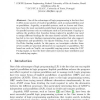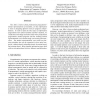1137 search results - page 78 / 228 » Knowledge Representation with Logic Programs |
112
Voted
EUROPAR
2000
Springer
15 years 6 months ago
2000
Springer
One of the advantages of logic programming is the fact that it offers many sources of implicit parallelism, such as and-parallelism and or-parallelism. Arguably, or-parallel system...
131
Voted
ATAL
2007
Springer
15 years 8 months ago
2007
Springer
We present a novel approach to knowledge-based automated oneshot multi-issue bilateral negotiation handling, in a homogeneous setting, both numerical features and non-numerical on...
138
click to vote
TABLEAUX
2005
Springer
15 years 8 months ago
2005
Springer
Abstract. Description Logics (DLs) are a family of logic based knowledge representation formalisms. Although they have a range of applications (e.g., configuration and information...
107
click to vote
IWPC
2005
IEEE
15 years 8 months ago
2005
IEEE
Very little is known about professional programmers’ mental representations of variables, yet this information is vital in designing effective tools for program comprehension. I...
151
Voted
DALT
2008
Springer
15 years 4 months ago
2008
Springer
The core capability of a rational agent is to choose its next action in a rational fashion, a capability that can be put to good use by a designer to satisfy the design objectives ...


